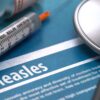The number of new COVID-19 cases and hospitalizations in Alabama have been declining, but public health experts warn against taking that to mean the threat is over. Hospitalizations remain very high, as do the number of new daily cases.
Meanwhile, state and federal officials continue to roll out vaccinations, but the supply of vaccines is low and the demand high.
Dr. Karen Landers, assistant state health officer with the Alabama Department of Public Health, told APR on Thursday that the department’s estimate of the positivity rate — the percent of COVID-19 tests that are positive — dropped to 13 percent as of Jan. 16. It had been a record-high 20 percent on Jan. 2, according to ADPH’s estimate.
“That’s never any reason for me to celebrate it. When it gets down below 5 percent I’ll feel like we’ve, we’ve accomplished our goal,” Landers said.
Landers noted that while hospitalizations have declined, the number of available ICU beds in the state remain low. Gov. Kay Ivey earlier on Thursday told reporters that at one point last week just 39 of the state’s approximately 1,600 ICU beds were available.
On Thursday 2,478 people were hospitalized with COVID-19 across the state, a 17 percent drop from two weeks ago but still 54 percent higher than the highest daily hospitalization number during Alabama’s summer surge.
{{CODE1}}
The state’s average of new daily cases over the last two weeks is 3,093. That’s an 18 percent drop from the same average a week ago, but the number is still high, and no comfort to Landers, who said the public should continue wearing masks, practicing social distancing and good hand hygiene.
“It’s not a cause for celebration, or a call for us to stop anything that we’re doing,” Landers said. “We literally have to stay the course. We literally have to continue all the mitigation standards, as well as the ongoing vaccine efforts.”
{{CODE2}}
President Joe Biden on Thursday signed a stack of executive orders focused on mitigating COVID-19. Among the orders is a requirement for the Federal Emergency Management Agency to set up at least 100 vaccination centers in a month’s time, and for the CDC to provide for vaccinations through local pharmacies beginning in early February. That plan is a partial carryover from the Trump administration, which didn’t complete the rollout before Biden took office.
Biden is also ordered that states be fully reimbursed for the costs of National Guard members to help set up vaccination sites.
“We didn’t get into this mess overnight, and it will take months to turn this around. Despite the best intentions we’re going to face setbacks “ Biden said. “To a nation waiting for action, let me be clear on this point: Help is on the way.”
Biden also released his wide-ranging national COVID-19 plan, which calls for more people able to give vaccinations, the use of the Defense Production act to help manufacture the needed vaccine supplies, buying more vaccines and providing more vaccination sites. The plan also calls for more money and resources to open more schools for in-person classes and for businesses to reopen safely.
Alabama State Health Officer Dr. Scott Harris told reporters Thursday that the state doesn’t have enough vaccine to meet the demand, and that hospitals “by and large are out,” except for allotments saved for required second doses and for some who’ve already scheduled for first shots.
Harris said the Alabama Department of Public Health has registered 502 sites across the state, which are now eligible to receive and administer vaccines, but said just a little over half of those have received vaccines “because we simply don’t have enough to go around.”
Dr. Anthony Fauci, chief medical advisor on Biden’s COVID-19 response team, told reporters Thursday at the White House that there should be enough data from the trial of Johnson & Johnson’s COVID-19 vaccine to begin analyzing in a week or two.
The company would then need to put together that data for review, and the vaccine would have to be approved by the U.S. Food and Drug Administration for use.
Asked about Biden’s executive orders and his larger plan, Landers said ADPH is awaiting more detailed information but said: “what would encourage me the most is to see an additional product approved.”
That might come by the middle or end of February, Landers said.











































